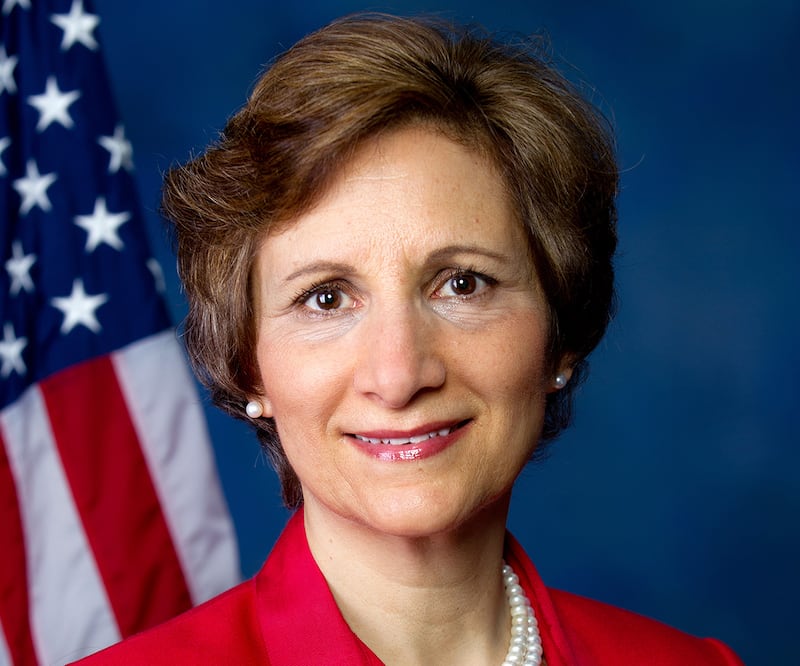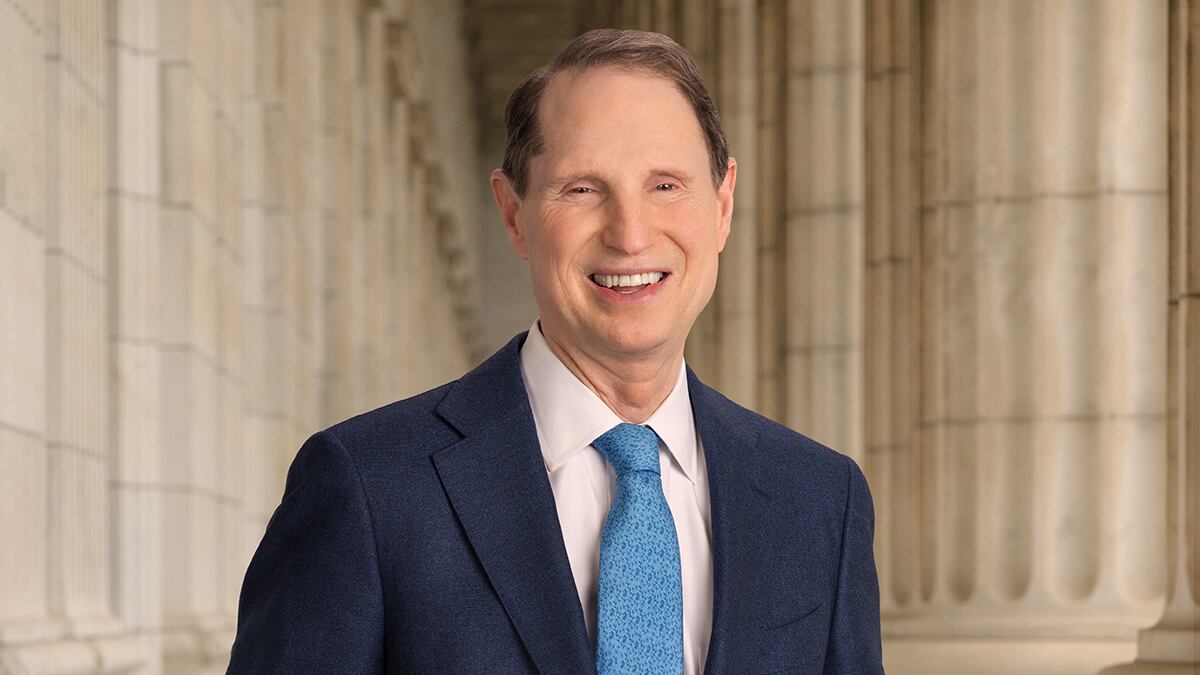U.S. Senate
Ron Wyden - Democrat
For 26 years, Wyden, 72, has served as senator from Oregon. He faces no meaningful opposition this time—from fellow Democrats or from Republicans. That may be an indictment of our current democratic system, but Oregon has good reason to return him to Washington, D.C., in the fall.
As chair of the Senate Select Committee on Finance, he holds the gavel to issues important to Oregonians, including the management of Social Security and Medicare. He has championed a tax on billionaires that President Joe Biden has now adopted, secured billions in unemployment relief during the pandemic, and passed a law that will bring together mental health care providers and law enforcement to respond to people in crisis on the streets. (It’s based on a model developed in Eugene.)
Ever since he voted against the U.S. Patriot Act in 2006, Wyden has been a leader in holding the federal government’s intelligence services to account. Intelligence overreach has not stopped in the intervening decades. And most recently he pushed for an audit of Homeland Security’s broad surveillance of immigrants’ money transfers to their home countries.
It is also worth recognizing that Wyden, who has fashioned a career as a champion of working across the aisle, was among the senators who less than a year into Trump’s term called on the former president to resign over allegations of sexual misconduct. Two failed impeachments and an attempted insurrection later, Wyden looks prescient.
The men running against him have not held elected office in the past and offered no compelling reason they should now. They include Brent Thompson, 75, and William Barlow III, 40.
Moment of joy when Wyden felt life was returning to normal: “A lot of people smiling” with their masks off (or on) as he visited one Fred Meyer the previous weekend.
Darin Harbick - Republican

Harbick, 53, a hotel and restaurant owner who served on the McKenzie High School board of directors and the chamber of commerce in the tiny logging town of Vida, is the strongest challenger Republicans can offer to Wyden. That’s not saying much. Harbick trotted out the line of argument that the federal government (not the pandemic) cratered his businesses. We don’t expect him to be a formidable challenger, but Harbick accepts the legitimacy of the Biden presidency, at least.
He faces Prineville Mayor Jason Beebe, 48, a veteran who has public service experience but made the suspect argument that he accepted his own county’s election protocols while questioning the results of elections elsewhere. Chris Christensen, 58, a former candidate for the 1st Congressional District, called himself the moderate of the bunch and offered that his priority in Congress would be to complete the Interstate Bridge project. Harbick’s public service gives him the edge.
Moment of joy when Harbick felt life was returning to normal: Not wearing a mask, and not making his employees enforce the state mask mandate.
U.S. House District 1
Suzanne Bonamici - Democrat

At a time when national and state politics are in upheaval, Suzanne Bonamici is as reliable as spring tulips.
First elected 10 years ago to a district that runs from Portland’s West Hills to the mouth of the Columbia River, Bonamici, 67, has grown in proficiency without showboating. She’s endearingly wonky—her favorite topic is ocean wave energy, and she formed a House caucus that’s trying to include art and music classics in STEM curriculum. Nerd! But her work on developing President Biden’s infrastructure bill and her commitment to fighting climate change remain much needed in Congress.
Bonamici faces nominal opposition from Scott Phillips, 57, an IT consultant. He’s running to bring more attention to issues such student debt relief.
Moment of joy when Bonamici felt life was returning to normal: A memorial service for her mother-in-law, delayed by two years. “It wasn’t joyful,” she says, “but it was meaningful.”
U.S. House District 5
Jamie McLeod-Skinner - Democrat

For seven terms, Kurt Schrader has represented a congressional district that runs like a belt across the Willamette Valley until it T-bones at the Oregon Coast. When state lawmakers drew new maps this year, they spun Schrader’s district east—removing the coastline and adding the zoomtown of Bend.
It’s a good time for a reassessment.
Schrader, 70, is a folksy veterinarian and the trail boss of a centrist caucus in Washington, D.C., that tries to keep the Democratic Party from moving too far left. He argues that such moderation is what makes him the only Democrat who can maintain control of a swing district where his party holds a mere 27,000-vote edge in voter registration over Republicans.
Such logic has previously swayed us—and it seems to have persuaded President Joe Biden, who endorsed Schrader last week.
The problem: In recent years, Schrader has been reliable only as an obstructionist. He voted against COVID stimulus checks because he wanted more means testing. He held up Biden’s infrastructure package because he didn’t want to let Medicare negotiate prescription drug prices. On a conference call with Democratic leadership, he complained that the second impeachment of President Donald Trump would be “a lynching.”
Schrader’s challenger, Jamie McLeod-Skinner, 54, would make an ambitious but not absurd leap to D.C. Much of her government work has been on volunteer boards in Central Oregon, including an elected seat on the Jefferson County Education Service District board. Yet among the candidates who’ve emerged from the Bernie Sanders movement, McLeod-Skinner strikes us as one of the more substantive. Her rigor in digging into Schrader’s voting record speaks well of her attention to detail. Her commitment to addressing climate change would be a welcome contrast to Schrader—like finding a cool ponderosa pine grove in the high desert.
If the president’s backing still gives you pause, consider who hasn’t endorsed Schrader: any of his five Democratic colleagues in the Oregon congressional delegation. And most of the county Democratic parties, including Clackamas where Schrader lives, endorse McLeod-Skinner.
Moment of joy when McLeod-Skinner felt life was returning to normal: Watching a friend’s daughter play in the Oregon State Basketball Championship in Redmond.
Jimmy Crumpacker - Republican

Crumpacker, 43, has offered no service to the district since he last ran for Congress in a different district two years ago. The new boundaries of Oregon’s congressional districts afford him a new opportunity to run.
In his previous run, Crumpacker was a Republican in the mold of Trump. Now he says he’s a moderate, acknowledging the legitimacy of the last presidential election and the reality of climate change.
Crumpacker, a graduate of Georgetown and former intern for U.S. Sen. Gordon Smith, worked on Wall Street before returning to Oregon. He is smart, knows energy and foreign policy. We give him the nod for his current decision to choose reason over extremism—at least for now.
Lori Chavez-DeRemer, 54, a marketing executive for her husband’s medical practice who ran unsuccessfully in two hard-fought races for the state Legislature in 2016 and 2018, was a moderate in the past, running on a pro-choice platform. She has now convinced some that she’s a true conservative and opposed to abortion (though she did not get Oregon Right to Life’s nod; Crumpacker did). We didn’t get a chance to ask her about that swivel. With such a notable change and a failure to find even five minutes to defend it, we can’t find a reason to endorse her this time.
Among the other candidates running is Laurel Roses, 62, a community leader and mother of five who has hardline views on climate change but is also open to abortion rights after the lived experiences of friends and neighbors. We are heartened to encounter views independent of party orthodoxy.
Moment of joy when Crumpacker felt life was returning to normal: A 40th birthday party for a friend.
U.S. House District 6
Andrea Salinas - Democrat

After a decade of population growth, Oregon earned a new, sixth congressional seat this year. The district is centered in the northern Willamette Valley and draws its largest bloc of voters from Marion County.
Because there is no incumbent to beat, a number of interesting candidates have surfaced.
Three-term state Rep. Teresa Alonso Leon (D-Woodburn), 47, is the first Mexican-born woman to serve in the Oregon Legislature. Dr. Kathleen Harder, 63, a Salem hospitalist, has a wealth of knowledge on health care, but her political experience is limited to losing a school board race. Cody Reynolds, 44, a West Point graduate who has made a fortune in cryptocurrency, says this race is the culmination of a 10-year plan to serve in Congress and, should he lose, “I’ll go back to mentoring artists.” Former two-term Multnomah County Commissioner Loretta Smith began her political career as an aide to U.S. Sen. Ron Wyden (D-Ore.), so she knows D.C. Matt West, 35, is an Intel engineer.
And then there’s Carrick Flynn, 35, a former foundation consultant who’s drawn $6 million in independent expenditures from Bahamas-based crypto-billionaire Sam Bankman-Fried but is otherwise a cipher (he ghosted WW’s endorsement interview). Flynn grew up in Vernonia but lived outside Oregon from 2008, when he graduated from college, until 2020, when he moved back during the pandemic. But he has a massive fundraising advantage, thanks to Bankman-Fried and the House Majority PAC, the national Democratic fundraising machine, which would love to have a nominee so generously bankrolled that it can concentrate its attention elsewhere. It’s difficult to find anybody in Oregon who knows Flynn, however, and we oppose outside groups buying congressional seats.
By contrast, state Rep. Andrea Salinas (D-Lake Oswego), 52, has built a track record both as a lobbyist for environmental, pro-choice and labor groups and as a smart and effective lawmaker since 2017. Prior to going to work in Salem, she served for a decade as a congressional aide to U.S. Sen. Harry Reid (D-Nev.) and Reps. Pete Stark (D-Calif.) and Darlene Hooley (D-Ore.). She’s a strong choice who deserves the nomination.
Moment of joy when Salinas felt life was returning to normal: Last October, she attended a Violent Femmes concert at the Les Schwab Amphitheater.
Ron Noble - Republican

Given the political geography, Democrats are expected to prevail in Oregon’s new congressional district. (The Dems have a 26,000-vote advantage in voter registration.) But seven Republicans are vying for a shot at the seat.
Only two of them came to our endorsement interview: state Rep. Ron Noble, who has represented parts of the new district since 2017, and Angela Plowhead, a clinical psychologist who began her career as an intelligence officer in the U.S. Air Force.
We’re big fans of independent thinking here at WW, and both Noble and Plowhead described positions that separate them from the Trump-era pack.
Noble, 62, is a former police officer who bucked his party on immigration. His son-in-law is from Ireland. Watching him navigate our broken immigration system convinced Noble that something must be done for people whom the right demonizes.
“If my daughter had fallen in love with someone from Mexico City, would I see my grandson?” Noble asks. “There are inequalities.”
That explains why he defied his party in 2019 and voted to allow undocumented immigrants to obtain Oregon driver’s licenses. Some of his conservatism sounds George Bush compassionate, but we thought Noble sounded pretty sincere about bridging divides, and his record speaks to that.
Plowhead spent much of our conversation railing against critical race theory. She’s a woman of mixed race, so her views interested us. Unfortunately, she fell back on familiar tropes.
Of other candidates, Mike Erickson is a logistics consultant who wants to reduce voter access, and Amy Courser, who owns a carpet cleaning company, spoke in 2020 at a QAnon recruiting rally. Neither offers a viable alternative to Noble.
Moment of joy when Noble felt life was returning to normal: When people could choose whether to wear a mask and not be demonized for their choice. “The wearing of a mask is not a political statement,” Noble says. “The willingness to be vaccinated is no longer a political statement.”

